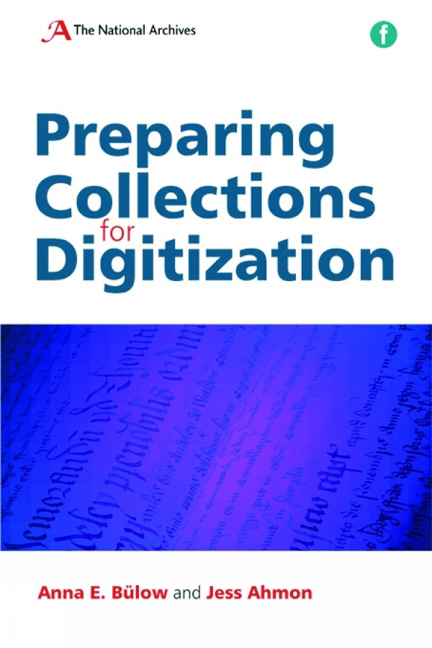Book contents
- Frontmatter
- Contents
- Acknowledgements
- List of figures and tables
- Introduction
- 1 Digitization in the context of collection management
- 2 Before you digitize: resources, suppliers and surrogates
- 3 The digital image Ross Spencer
- 4 The process of selection
- 5 Surveying collections
- 6 Equipment for image capture
- 7 Preparation of document formats and fastenings
- 8 Preparation of damaged documents
- 9 Setting up the imaging operation
- Conclusion
- Further reading
- Index
2 - Before you digitize: resources, suppliers and surrogates
Published online by Cambridge University Press: 08 June 2018
- Frontmatter
- Contents
- Acknowledgements
- List of figures and tables
- Introduction
- 1 Digitization in the context of collection management
- 2 Before you digitize: resources, suppliers and surrogates
- 3 The digital image Ross Spencer
- 4 The process of selection
- 5 Surveying collections
- 6 Equipment for image capture
- 7 Preparation of document formats and fastenings
- 8 Preparation of damaged documents
- 9 Setting up the imaging operation
- Conclusion
- Further reading
- Index
Summary
Introduction
As seen in Chapter 1 ‘Digitization in the context of collection management’, digitization is much more than simply image capture. Managing digitization projects involves managing numerous technical, legal and logistical issues. The many aspects of project management are beyond the scope of this book, but are covered in detail by Hughes (2004).
When embarking on digitization there are a number of fundamental issues that need to be considered before individual projects are initiated. Many of these issues concern the preservation of the collection and so the collection manager must ensure that they are included in the decision-making process. The issues discussed here are: the implications for an institution's resources; the pros and cons of outsourcing; and the role of microfilm.
Impact on the institution
A digitization programme, like any major new initiative, will have an impact on the resources of an institution. It must be recognized that digitization projects are complex and that they require contributions from a number of different experts. Even if externally funded through grants, commercial or academic partnerships, they will require a library or archive to rethink their priorities in order to dedicate enough internal resources (Bülow, 2009). Staff who might be involved with such projects include:
• curators and archivists
• copyright experts
• procurement staff or legal advisors
• conservators
• scanning operators or imaging experts
• IT support staff
• digital preservation experts
• public-facing staff who are familiar with the needs of users
• marketing and press staff.
Inevitably not all institutions will have experts in all of these fields. Where internal experts are not available, a library or archive might need to think of alternative ways of getting advice, which may come at a cost; see Hughes (2004, 104–6) for other sources of expertise. For an institution wishing to implement an extensive digitization programme it is worth investing in existing staff so that they can acquire some of the necessary skills. When staff develop a specialism in digitization the impact is that departmental priorities and work plans might have to be adjusted to allow time for their involvement in digitization projects. The advantage of developing in-house expertise is that this will help to ensure that the digitization programme can remain sustainable in the long term.
- Type
- Chapter
- Information
- Preparing Collections for Digitization , pp. 17 - 32Publisher: FacetPrint publication year: 2010



